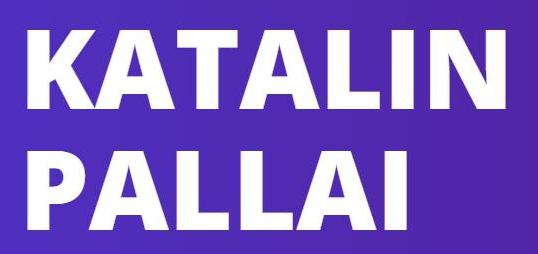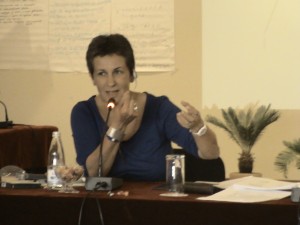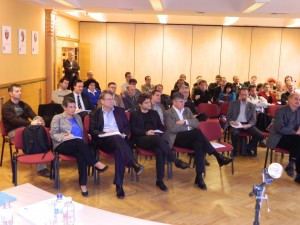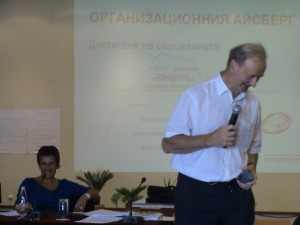Leading collaborative process of complex curriculum and faculty development. since 2014
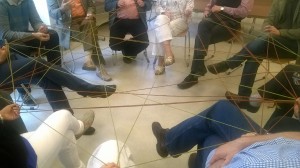 I was commissioned to design a new curriculum for a one year long post graduate program for integrity advisers. I designed a curriculum development process that was different from the usual academic process in three dimensions. The first was, that faculty could not transmit established knowledge about an established profession but had to create a new practice for a new professional field. This condition led to the two other new dimensions: one was a collaborative curriculum development process, and the other that the process happened across the traditional boundary between academia and practice. I involved three groups of professionals : academics, anti-corruption practitioners and professionals from the fields of organizational development and dialogic processes. I worked with the faculty through a series of faculty workshops with the aim (1) to offer own experience for faculty of a space for integrative dialogue, (2) to use the process for creating substantive synergy among the various subjects that are delivered by them, (3) to create shared norms and objectives not only for the delivery of content but also for the ethical stance faculty transmits to students, and (4) to build the methodological development of faculty on these own experiences. The process has not ended yet but it has already achieved a specific culture for faculty relations and for the education within the program, has impact on both the coherence of content and the diversity of teaching methods, and has engendered some new practices for integrity advising. Pallai paper WCCI integrity pedagogy
I was commissioned to design a new curriculum for a one year long post graduate program for integrity advisers. I designed a curriculum development process that was different from the usual academic process in three dimensions. The first was, that faculty could not transmit established knowledge about an established profession but had to create a new practice for a new professional field. This condition led to the two other new dimensions: one was a collaborative curriculum development process, and the other that the process happened across the traditional boundary between academia and practice. I involved three groups of professionals : academics, anti-corruption practitioners and professionals from the fields of organizational development and dialogic processes. I worked with the faculty through a series of faculty workshops with the aim (1) to offer own experience for faculty of a space for integrative dialogue, (2) to use the process for creating substantive synergy among the various subjects that are delivered by them, (3) to create shared norms and objectives not only for the delivery of content but also for the ethical stance faculty transmits to students, and (4) to build the methodological development of faculty on these own experiences. The process has not ended yet but it has already achieved a specific culture for faculty relations and for the education within the program, has impact on both the coherence of content and the diversity of teaching methods, and has engendered some new practices for integrity advising. Pallai paper WCCI integrity pedagogy
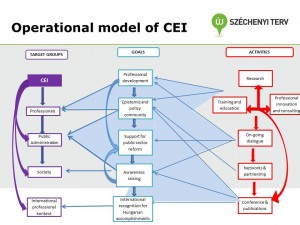 Building up the Center for Excellence in Integrity at the National University for Public Service (Hungary), 2014-15
Building up the Center for Excellence in Integrity at the National University for Public Service (Hungary), 2014-15
Head of the Center
The Center for Excellence in Integrity (CEI) was establish to secure sustainability for the results obtained in the project below. The mission of CEI is to foster the implementation of public purpose in Hungary by gathering, generating and disseminating knowledge and innovative methods for corruption prevention and taking an active part in advancing the case for integrity. CEI supports the culture of integrity in the Hungarian public sector by policy initiatives and by knowledge sharing among professionals and to the wider public. My duty is to launch the operation of the Center and develop a strategy for the role it should play and for its sustainable functioning.
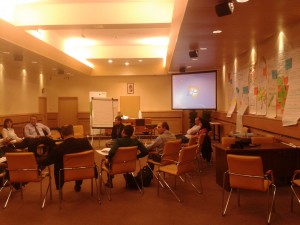
Public ethics and integrity education for senior civil servants, 2013
Lead expert on training curriculum development
In the frame of a large EU financed project on Corruption Prevention, implemented in cooperation between the Hungarian National University of Public Service and the Ministry of Public Administration, I was commissioned to develop training curricula for integrity advisers and civil servants. On the basis of the methodology I developed the largest further education program of the Hungarian public administration is being implemented: more than 800 senior civil servants and 8500 civil servants are educated on corruption prevention and on approaches to strengthen organizational integrity. Due to wide acknowledgment I also had the opportunity to train a group of state secretaries, deputy state secretaries and government commissioners.
The methodology I developed was peer reviewed by a high level international peer team and acknowledge as innovative even in the 2014 Anticorruption Report of the European Commission. See some of the peer review reports Vasilache peer review report EllenGPeerReviewTraining10-12Dec13 short
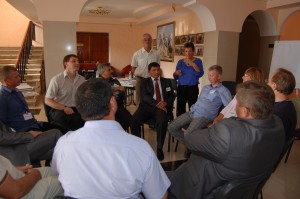 Leadership Academy of the Council of Europe
Leadership Academy of the Council of Europe
Expert and trainer, since 2011
The program offers a cycle of one year long leadership education for local government leaders. The aim of the program is to offer a framework for the analysis of the actual municipal performance and initiate reflection on possible improvements; to assist leaders to learn how to say yes to challenges, how to release leadership capacities in others and how to create an environment in which others want to work with them, share their purpose and follow their lead. In the program I was an expert contributing to the curriculum development and was involved in the training and coaching the local trainers process in multiple countries. Leadership Academy. (Hungarian Program)
Leadership Academy Program in Hungary
Lead expert and trainer, since 2011
The program offers nine month long leadership education for Hungarian local government leaders. It is an adapted version of the Council of Europe Leadership Academy program. The aim of the program is to offer a framework for the analysis of the actual municipal performance and initiate reflection on possible improvements; to assist leaders to learn how to say yes to challenges, how to release leadership capacities in others and how to create an environment in which others want to work with them, share their purpose and follow their lead. The program is implemented in Hungary in cooperation with the Hungarian Association of Local Governments. On a joint appointment of the two implementing organization I am commissioned to be the lead expert whose duties are: adaptation of the methodology, elaboration of training materials, delivery of training and coaching for the participating decision makers.
Leadership Academy. in Bulgaria, Ukraine, Montenegro
Trainer and coach of local trainers, since 2011 The aim of the program is to assist leaders to learn how to build effective organizations and release leadership capacities in others, and how to create an environment in which others want to work with them, share their purpose and follow their lead. My role in these countries is to act as trainer during the first cycle of presentation and/or act as mentor and coach local trainers while they gain expertise to lead the program in their own countries.
Renewal of the urban planning system of Pécs, Process adviser, 2011-12
In the city of Pécs a civil initiative, Városkooperáció, was formed to initiate public dialogue on urban planning, create communication channels among local stakeholders and decision makers in order to create a wide dialogue on a new city strategy and the renewal of the local planning system and process. This initiative asked me to advise the Board of the initiative and help facilitating the process and the events.
Alternative Dispute Resolution in Schools
Mentor mediator, Education Research and Development Institute, 2011
I worked in the frame of the multi year project “Alternative Dispute Resolution: the introduction of interest-based and restorative processes in schools.” My duties were the following: advice on project development, process management and professional decisions of the project management, support of teachers and mediators trained by the project to start practice (mentoring, case discussion and analysis, co-mediation supervision) Planning and leading activities in schools that support the introduction of AVR approaches in school activities, routines and procedures.
Leadership Academy
Program developer and Trainer of trainers, Council of Europe, since 2011
The program offers nine month long education for local government leaders. Its central theme is that every person has leadership capabilities that can be released and enhanced. One aim of the program is to offer a framework for the analysis of the actual municipal performance and initiate reflection on possible improvements. The other, and key, purpose of the program is to assist leaders to learn how to say yes to challenges, how to release leadership capacities in others and how to create an environment in which others want to work with them, share their purpose and follow their lead. This is a multi-country program of the Council of Europe. In 2011 spring with a colleague we trained the teams of trainers for five countries. The plan is that I will lead the Hungarian adaptation and delivery of the program and assist some of the other country teams in their adaptation and delivery.
Public participation in multi-ethnic local governments
Research and course manual writing. LGI/Open Society Institute, 2011
In jurisdictions where different ethnic groups share a place where they live, and the conceptualization of some local affairs is differentiated along ethnic lines participation of stakeholders in the policy process is essential to building sustainable and just local societies. The manual discusses how public participation can be de-signed and managed in multi-ethnic contexts in a manner that it can support the implementation of the policy goals set by the local political community. The manual presents the key terms and concepts and the most important body of practical knowledge on local public participation, and examines the specific consequences of the multi-ethnic environment on the design and implementation of participatory mechanisms.
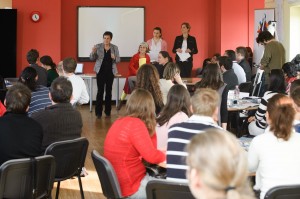 Built heritage in local governance
Built heritage in local governance
Distance learning course devel-opment. ISES (In-stitute for European and Social Studies), 2011
Distance learning course in the frame of the post graduate Cultural Heritage Management Program of the Institute for Social & European Studies (ISES) and Corvinus University, Budapest. The purpose of the course is to discuss the implications of heritage and conservation practices to the local context, with focus on the social and political dimen-sions, and to discuss deliberative democratic processes that can support the heritage management. Key themes are the role of heritage in place making and the negotiations related to heritage within the local political community. By the end of the course students become able to recognize the possibilities that different participatory mechanisms can offer for the negotiation and collaboration of stakeholders, and with this knowledge and skills they will improve their capacity to engage in effective and collaborative negotiation with other stakeholders about the local built heritage.
Public participation in local governance
Course designer and trainer, Academy for Mayors, 2010-2011
The Academy for Mayors was established by the Corvinus University and the Associa-tion of Hungarian Local governments with the support offered by the Norwegian bilateral funds. Within the frame of the Academy the elected decision makers receive a one year long post graduate education. After the success of our mediation course designed for the first year of the program, I received an invitation to elaborate a module on public participation. The course is focused on those practical considerations and competencies that decision makers need to have in order to make wise decisions on and fulfill their role in local participatory processes. The discussion of the basic concepts and methods are connected to concrete cases and widely used practices. The cases are also the starting points for the discussion of possible decision criteria, dilemmas, costs and benefits of participatory processes.
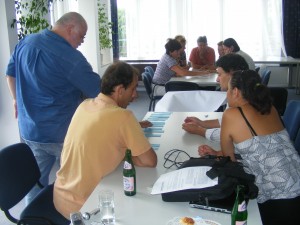 Mediation: Conflict management and resolution
Mediation: Conflict management and resolution
Course designer and trainer, Academy for Mayors, 2009-2011
The Academy for Mayors was established by the Corvinus University and the Association of Hungarian Local governments with the support offered by the Norwegian bilateral funds. Within the frame of the Academy Mayors a one year long post graduate education is offered for the elected decision makers. During the first year of the program I was commissioned (with a colleague) to elaborate a module on the management of conflicts related to local issues and inter-municipal disputes. The tasks were the preparation of a textbook for the participants and a teaching method for conflict resolution. The module was based on experience-based training technique. Its components included, practical exercises, skill building elements, case study analysis, discussions and short conceptual and knowledge components. After the success of the course during the first year, we recieved an invitation for an extended version for the second year.
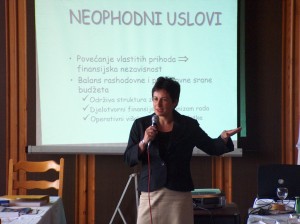 Mentoring Municipalities in Roma Education
Mentoring Municipalities in Roma Education
Lead expert in training design and trainer of trainers, Open So-ciety Insti-tute and Roma Education Fund, 2010
The Roma Education Fund supports the DILS project whose goal is to support local governments and stakeholders in developing and implementing an integrated enrollment policy and system support for the successful education of Roma children – from the preparatory pre-school education onwards – incorporated in the Local Action Plans for Roma education. One component of the program was to train Mentors to work with local governments and support the elaboration and implementation of integration strategies and policies. My role was to supervise the design and elaboration of the materials for the training of the mentors, and to train the Serbian speaking trainers who were commissioned with the training of mentors.
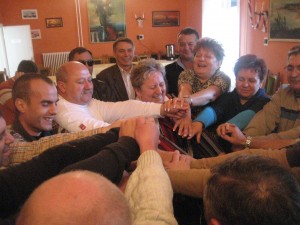 Training of councilors.
Training of councilors.
Program dedsigner and trainer of trainers, Hungarian Association of Local Governments, 2010
In the frame of a cooperation between the Hungarian and Norwegian Association of Local Governments I was responsible for the elaboration of a training progran for the new local councilors who were elected in autumn. In the frame of the program I developed a training methodology and package, and trained a first group of 40 trainers to deliver the trainings for the newly elected local assembly members. The aim was to train the assembly members of one local government together in order to work not only on their individual knowledge but also on their shared assumptions and personal relations. Training components assist the participants to acquire the requisite knowledge, the appropriate attitude and the necessary skills that are required to foster decentralisation and make municipal administration and management a success. My role was to design the training program and train the first group of trainers and assemblies.
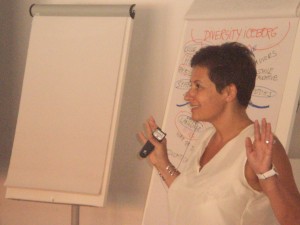 Minority rights and local governance.
Minority rights and local governance.
Course designer and trainer, Open Society Institute, Management of Multi-Ethnic Communities Program, 2010
This course focused on local political opportunities (and limitations) in the ac-commodation of the needs and aspirations of ethno cultural minorities with a special interest in the normative dimension. This course centered on ‘public participation’, since this is regarded as a foundational minority right, that is a right that is essential for the realization of other minority rights. New element was in the course, compared to earlier our courses on the topic the distinction between issue based participation and participatory institution building, and the deeper analysis of the relation between participatory institution building and the process of international and local norm formation process.
Support of Local Leadership in Roma Integration
Lead expert, Open Society Institute and Hungarian Association of Local Governments, Hungary, 2010
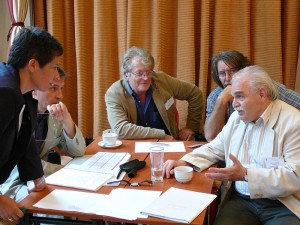 The project applies the Peer Review methodology of the Council of Europe whose Hungarian adaptation and introduction I supported during the previous years. A group of experts conducts a systematic analysis of the local government leadership and management, but the focus in this project is not general assessment as in the original method, but the possibility to foster Roma integration in the locality, The task of the peer team is to identify the specific interventions supporting Roma integration that seem to be possible in the actual conditions. Instead of pushing “supply driven” projects, the team focuses on what seems best and feasible in the given context. A series of peer reviews will lead to a study that will attempt to draw some more general conclusions from the common filed experiences and offer some suggestions for donors involved in the domain of Roma integration. My role was to elaborate the project concept and lead the implementation as lead expert.
The project applies the Peer Review methodology of the Council of Europe whose Hungarian adaptation and introduction I supported during the previous years. A group of experts conducts a systematic analysis of the local government leadership and management, but the focus in this project is not general assessment as in the original method, but the possibility to foster Roma integration in the locality, The task of the peer team is to identify the specific interventions supporting Roma integration that seem to be possible in the actual conditions. Instead of pushing “supply driven” projects, the team focuses on what seems best and feasible in the given context. A series of peer reviews will lead to a study that will attempt to draw some more general conclusions from the common filed experiences and offer some suggestions for donors involved in the domain of Roma integration. My role was to elaborate the project concept and lead the implementation as lead expert.
Minority rights and local governance.
Course designer and trainer, Open Society Institute, Management of Multi-Ethnic Communities Program, 2009
Minority rights and local governance. This course focused on local political opportunities (and limitations) in the accommodation of the needs and aspirations of ethno cultural minorities with a special interest in the normative dimension. Of the numerous inter-nationally granted minority rights, this course centered on ‘public participation’, since this is regarded as a foundational minority right, that is a right that is essential for the realization of other minority rights. The course discussed existing local multicultural policies and practices in order to identify the major issues and dilemmas in the local management of ethnocultural diversity. In order to understand these issues and dilemmas, various (often overlapping) aspects of the local political opportunities were ana-lyzed that can enable or block the local accommodation of ethno cultural diversity.
Peer Review of local governments
Lead expert, Council of Europe and Hungarian Association of Local Governments, Hungary, 2009
Peer reviews are systematic analysis of the local government leadership and management in a locality, conducted by a team of experienced local government decision makers and experts form other localities (the peers), according to a CoE methodology. The peer review process provides the evidence from both documents and stakeholders on the basis of which an assessment can be made. The focus of the assessment is on the corporate leadership and management of the local authority rather than the detailed operations of individual services. On the basis of the assessment the peer team supports the local government to draw up and implement an Improvement Plan. Ms Pallai, who has already assisted many other countries in the implementation of the program, has guided the work of the adaptation of the benchmark system and work methodology, and led the first peer reviews in Hungary.
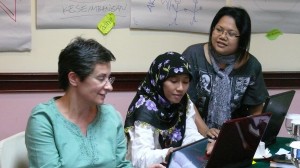 Local Development Planning in context of Extractive Industries
Local Development Planning in context of Extractive Industries
Expert on planning for LGI/OSI and Revenue Watch Institute, International cooperation, 2009
Revenue Watch Institute and the Local Government and Public Service Initiative of the Open Society Institute has launched a project to assist local NGOs in various countries to establish multi-stakeholder processes to strengthen transparency extractive revenues of government and planning processes; and establish local participatory planning processes that assist local governments in effective spending of extractive revenues. Ms Pallai’s task is to elaborate a planning methodology that accommodates all specificities of the extractive industry context into the development planning process and can be adapted to fit the different national regulatory frameworks. (brief) www.lgi.osi.hu
Economic Opportunities for the Greater Tirana Region – Technical assistance
Consultant for Local Government Initiative of the Open Society Institute, Albania, 2008
In the frame of the project the Municipality of Tirana initiates public dialogue with other local governments and stakeholders within the Greater Tirana Region in order to set up systematic data collection and analysis for local economic development policy making. The project prepares the ground for substantial dialogue on a development strategy for the conurbation. Ms Pallai’s role in the project is to advise process design in order to secure effective participation of stakeholders and substantial transfer of knowledge between the international experts and the local team. www.lgi.osi.hu
Best Practice Program
Expert for Council of Europe, Hungary, 2008-ongoing
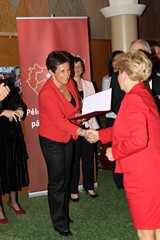 This project enables the identification of local authorities demonstrating best practices in key areas of their responsibilities. These local authorities are provided with support in order to enable them to share their best practices with others. In Hungary the Hungarian Association of Local Governments (TÖOSZ) is the partner of the Council of Europe. As a council of Europe expert, Ms Pallai, who has already assisted many other countries in the implementation of the program, oversees the process of adaptation, and advices and supports the implementation of the program. In the frame of the program she also leads trainings for the best local governments on presentation skills, and supports them in planning and implementing the dissemination of their practices.
This project enables the identification of local authorities demonstrating best practices in key areas of their responsibilities. These local authorities are provided with support in order to enable them to share their best practices with others. In Hungary the Hungarian Association of Local Governments (TÖOSZ) is the partner of the Council of Europe. As a council of Europe expert, Ms Pallai, who has already assisted many other countries in the implementation of the program, oversees the process of adaptation, and advices and supports the implementation of the program. In the frame of the program she also leads trainings for the best local governments on presentation skills, and supports them in planning and implementing the dissemination of their practices.
Strategy workshop – Master-course on local leadership.
Course designer and trainerfor F 38 Ltd. and Urbanissimus, Hungary, 2007-2008
The workshop is a private initiative of Ms Pallai. The goal is to propagate and facilitate the application of governance approaches to local leadership and participatory city strategy processes. With interactive adult learning methodology, the workshop urges local leaders to reflection on their leadership approaches, practices and possibilities. The program consists of a series of two days events where participants learn about new approaches and cases studies and appropriate the new knowledge through guided discussions and application exercises. The program was first organized in 2007 with the participation of 16 Mayors and some appointed leaders of important Hungarian settlements. Since, as a response to the demand expressed, it has been twice repeated for the colleagues of the alumni and for leaders of other local governments.
Leadership Benchmark Program
Consultant and trainer, Macedonia and Montenegro Council of Europe, Hungary, 2007-ongoing
The Council of Europe’s ‘Benchmark of an Effective Democratic Local Authority’ sets out a set of criteria that define the characteristics of more effective and less effective local authorities in terms of both their leadership, service provision and community engagement. The Leadership Benchmark Program enables a local authority to first assess itself against that Benchmark with help from a ‘Peer Review Team’, and then, on the basis of that assessment, draw up an Improvement Programme for building on its strengths, exploiting opportunities, and tackling its weaknesses – that is, for achieving the Benchmark standards. Ms Pallai is involved in training and supporting mayors, senior local decision makers and civil servants participating in the program.
City Strategy for Belgrade
OSI/LGI adviser, Serbia, 2007
Technical assistance since 2006 and expert team has been working on the elaboration of a City Strategy for the City of Belgrade. Ms Pallai was invited by the team and the city to advise on the strategy development process and on the formulation of the strategy.
Best Practice Program
Expert for Council of Europe, Macedonia and Montenegro, 2007-ongoing
This project enables the identification of local authorities demonstrating best practices in key areas of their responsibilities. The Council of Europe works with the Local Government Asssociations, who organize the process of competition for the practices and support the local authorities to enable them to share their best practices with others. As a council of Europe expert, Ms Pallai, oversees the process of adaptation, and advices and supports the implementation of the program. In the frame of the program she also leads trainings for the best local governments on presentation skills.
Strategic Approach to Governance at the Local Level – the New Paradigm
Team leader for LGI and Urbanissimus, Hungary, 2006-2007
Ms. Pallai recruited a team of leading decision makers and senior local government management and development professionals to elaborate approaches to local governance that are applicable in the CEE context. Ms. Pallai also designed a series of workshops for senior practitioners where the team presented their conclusions – the new paradigm. Added value of the project was to produce innovations for post-communist transformation of local government management and local strategic planning processes that could be applicable in the SEE and fSU regions. www.lgi.osi.hu
Local Government Capacity Building
Key Expert for ICON on EU Project, Croatia, 2006
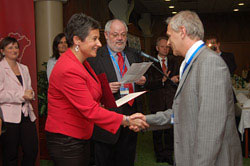 The project assisted the Croatian government and local governments to (1) execute a comprehensive Training Needs Assessment; (2) elaborate the National Training Strategy for the life-long education of local civil servants; (3) accomplish the foundation of a Local Democracy Academy and (4) train the Academy’s core staff. The Key expert was responsible for managing and leading this whole process.
The project assisted the Croatian government and local governments to (1) execute a comprehensive Training Needs Assessment; (2) elaborate the National Training Strategy for the life-long education of local civil servants; (3) accomplish the foundation of a Local Democracy Academy and (4) train the Academy’s core staff. The Key expert was responsible for managing and leading this whole process.
Strategic Planning as City Leadership and Management Tool, executive program organized by UNDP Montenegro
Designer for course director for UNDP, Montenegro, 2005
The program supported local decision makers in developing their leadership skills based on better strategising, an approach that serves the new governance paradigm of public management. It offered an integrated approach to community leadership, strategy, participation and communication – tools and practices to encourage and steer community efforts. All local governments of Montenegro participated in the two rounds of the training with representation by the mayor and/or some chief executives.
USAID-GRASP Program in Romania
Senior Policy Reform Director for DAI for the USAID sponsored GRASP project, Romania, 2003-2004
Governance Reform and Sustainable Partnerships (GRASP) was a five years USAID-funded program designed to strengthen Romanian local governance and civil society capacity. The objective of Ms Pallai’s assignment was to provide overall coordination and guidance for the GRASP policy reform program, so as it could lead to substantive professional support for the Romanian decentralization process. Within this work Ms Pallai assisted the Romanian government in the development of the Public Administration Reform Strategy for the EU Accession (adopted in 2004); supported the Association of Local Governments to develop policy position documents; assisted the government to establish a donor coordination mechanism; and lead the development of various policy papers.
Romanian Government Strategy – Decentralization and Fiscal decentralization chapter
Team Leader for DAI for the USAID sponsored GRASP project, Romania, 2003
The project assisted the Romanian government in updating its decentralization strategy by preparing the chapters on Service Delivery Decentralization and Fiscal Decentralization presented at the meeting between the government and EU representatives. Ms Pallai was invited to lead the expert group responsible for the drafting of this document and produce the final product. The document that the project produced was the basis of the public debates on the Public Administration Reform Strategy for the EU Accession.
Revision of the Local Government Law and Law on the Capital City, Skopje, Macedonia
Consultant for Urban Institute and DAI on USAID sponsored projects, Macedonia, 2000-2001
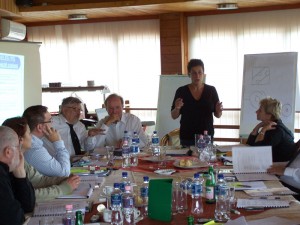 Working on a USAID contract within Macedonia; first with the Urban Institute, and later DAI, Ms Pallai offered technical assistance to the Ministry of Local Government in support of its lead role in implementing the Government’s Strategy for Reform of the System of Local Self-Government. Ms Pallai was also invited repeatedly on short term assignments years by both organizations to contribute to the preparatory work on revisions to the Local Government and the Capital City Laws.
Working on a USAID contract within Macedonia; first with the Urban Institute, and later DAI, Ms Pallai offered technical assistance to the Ministry of Local Government in support of its lead role in implementing the Government’s Strategy for Reform of the System of Local Self-Government. Ms Pallai was also invited repeatedly on short term assignments years by both organizations to contribute to the preparatory work on revisions to the Local Government and the Capital City Laws.
Local Government Reform and Law Program
Expert and trainer for USAID& Urban Institute, later DAI, Macedonia, 2000-2001
In Macedonia on a USAID contract first the Urban Institute, later DAI offered technical assistance to the Ministry of Local Government in support of its lead role in implementing the government’s Strategy for Reform of the System of Local Self-Government. Ms Pallai was invited repeteadly on short term assignments during the last years by both organizations as of “an expert with extensive experience in the reform of intergovernmental fiscal systems in the transition countries of Central and Eastern Europe in general and experiences of capital cities in particular. She contributed to the work on revision of the Local Government role and the Law of the Capital City.
Center for Policy Studies
Director for Central European University Managing, Hungary, 2000
The Center for Policy Studies was created to improve the policy environment in the region by promoting the development of policy centers, improving professionalism of practitioners and analysts, stimulating and conducting quality research in strategic areas and diversifying the sources of public policy input. As a managing director Ms Pallai’s responsibility was the setting up and the start of functioning of the Center and the development of the first strategy and action plan.
The Center was also initiated the introduction of public policy education to the university by planning an accredited Public Policy Masters Program and a department for Public Policy at the Central European University. After this challenge was accomplished she withdrew to her preferred role of a consultant.
Counsellor to the Mayor of Budapest
Counsellor for the Office of the Mayor of Budapest, Hungary, 1991-2001
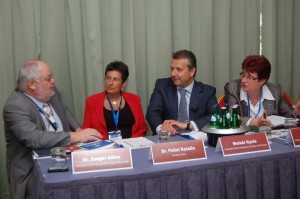 Between 1991 and 2001, as a freelance expert, she has been working directly for the Mayor and for his expert team. She was a participant in the drafting and implementation of the urban policy reforms in Budapest. Several times she led expert teams drafting various comprehensive urban policy documents for Budapest. She has been chief planner and project director of the elaboration of the major urban policy concepts during the 1990s (1991, 1994, 1998) and was also active in the Project Coordination Board of the City between 1994 and 1998. Ms. Pallai’s other task was to advise the Mayor’s Office on inputs to legislative drafts, issues related to regional development and advise the representation of the Municipality on different regional and developmental boards. She was author of various publications of the Mayor’s office that presented the policy concepts and results planned and achieved. In 2003-2004 she edited and partly wrote a book on the history and analysis of the twelve years of the municipal reform process in Budapest.
Between 1991 and 2001, as a freelance expert, she has been working directly for the Mayor and for his expert team. She was a participant in the drafting and implementation of the urban policy reforms in Budapest. Several times she led expert teams drafting various comprehensive urban policy documents for Budapest. She has been chief planner and project director of the elaboration of the major urban policy concepts during the 1990s (1991, 1994, 1998) and was also active in the Project Coordination Board of the City between 1994 and 1998. Ms. Pallai’s other task was to advise the Mayor’s Office on inputs to legislative drafts, issues related to regional development and advise the representation of the Municipality on different regional and developmental boards. She was author of various publications of the Mayor’s office that presented the policy concepts and results planned and achieved. In 2003-2004 she edited and partly wrote a book on the history and analysis of the twelve years of the municipal reform process in Budapest.
